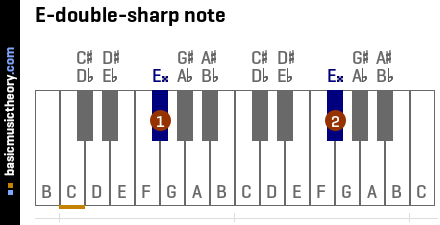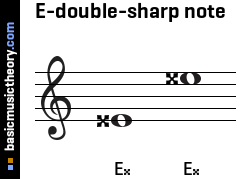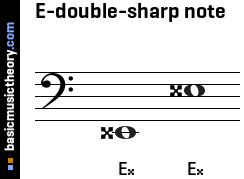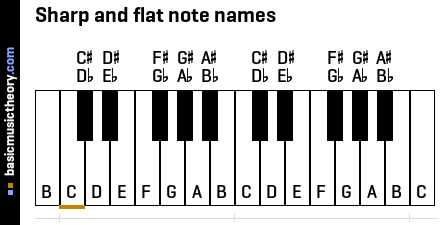E-double-sharp note
The Solution below shows the position of note E-double-sharp on the piano, treble clef and bass clef.
The Lesson steps then describe the note characteristics and relationship with the notes around it, and also lists which scales the note is in.
For a quick summary of this topic, have a look at Note name.
| Key | C | C# | Db | D | D# | Eb | E | E# | Fb | F | F# | Gb | G | G# | Ab | A | A# | Bb | B | B# | Cb |
|---|
Solution
1. E-double-sharp note
E## is a black key on the piano.
Another name for E## is F#, which has the same note pitch / sound, which means that the two note names are enharmonic to each other.
It is called double-sharp because it is 2 half-tone(s) / semitone(s) up from the white note after which is is named - note E.

Middle C (midi note 60) is shown with an orange line under the 2nd note on the piano diagram.
These note names are shown below on the treble clef followed by the bass clef.


| Bass Clef: | Midi | MP3 | Treble Clef: | Midi | MP3 |
Lesson steps
1. Piano key note names
The white keys are named using the alphabetic letters A, B, C, D, E, F, and G, which is a pattern that repeats up the piano keyboard.
Every white or black key could have a flat(b) or sharp(#) accidental name, depending on how that note is used. In a later step, if sharp or flat notes are used, the exact accidental names will be chosen.

The audio files below play every note shown on the piano above, so middle C (marked with an orange line at the bottom) is the 2nd note heard.
| Bass Clef: | Midi | MP3 | Treble Clef: | Midi | MP3 |
2. E-double-sharp note
E## is a black key on the piano.
Another name for E## is F#, which has the same note pitch / sound, which means that the two note names are enharmonic to each other.
It is called double-sharp because it is 2 half-tone(s) / semitone(s) up from the white note after which is is named - note E.
The next note up from E## is G.
Or put another way, G is 1 half-tone / semitone higher than E##.
The next note down from E## is F.
Or put another way, F is 1 half-tone / semitone lower than E##.

| Bass Clef: | Midi | MP3 | Treble Clef: | Midi | MP3 |
3. Note E-double-sharp is found in which scales ?
| E-double-sharp is the mediant of C## major scale (third note) |
| E-double-sharp is the supertonic of D## major scale (second note) |
| E-double-sharp is the leading tone of F## major scale (seventh note) |
| E-double-sharp is the submediant of G## major scale (sixth note) |
| E-double-sharp is the dominant of A## major scale (fifth note) |
| E-double-sharp is the supertonic of D## natural minor scale (second note) |
| E-double-sharp is the dominant of A## natural minor scale (fifth note) |
| E-double-sharp is the supertonic of D## harmonic minor scale (second note) |
| E-double-sharp is the leading tone of F## harmonic minor scale (seventh note) |
| E-double-sharp is the dominant of A## harmonic minor scale (fifth note) |
| E-double-sharp is the supertonic of D## melodic minor scale (second note) |
| E-double-sharp is the leading tone of F## melodic minor scale (seventh note) |
| E-double-sharp is the submediant of G## melodic minor scale (sixth note) |
| E-double-sharp is the dominant of A## melodic minor scale (fifth note) |
| Key | C | C# | Db | D | D# | Eb | E | E# | Fb | F | F# | Gb | G | G# | Ab | A | A# | Bb | B | B# | Cb |
|---|
| Related links | Note E-double-sharp |
|---|---|
| Circle of 5ths | Learn the circle of fifths |
| Cadences | E## major perfect authentic, E## major imperfect authentic, E## major plagal, E## major half, E## major deceptive |